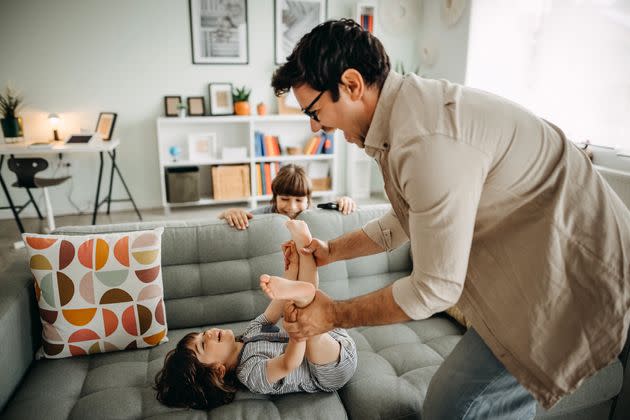How The Pandemic Changed These Dads’ Relationships With Work And Family

Before the COVID-19 pandemic hit, Jake Schuldies thought he was a really hands-on dad. He had a long commute and worked over 55 hours a week — but he adored his 9-year-old son and foster children, and he believed his marriage was “pretty egalitarian.”
Then Schludies, a licensed clinical social worker who pivoted to private practice, began working from home when the pandemic hit. It was a revelation. For the first time, he really understood just how much had been happening while he was at work.
“I realized I’d spent most of my life wrapping my home life around my career,” said Schludies, 42. That flipped during the pandemic, and Schludies said he will never, ever go back.
“I’m proud of baking bread on the weekends, of the garden I have at home, of taking our kids to camp. I’m proud that I was there, attending parent-teacher conferences,” he said. “I see our family as much more clear and cohesive now.”
The COVID-19 pandemic has stretched American families in countless ways — and, in particular, has pushed working mothers to the brink. From February 2020 to March 2021, nearly 1.1 million women of prime working age dropped out of the labor force, compared to 830,000 men in the same age group. Mothers working from home were two times more likely than dads to be the primary person responsible for parenting and housework. For more than a year, moms have been asked to perform an impossible juggling act, balancing remote school and full-time child care with work, all while attempting to guide their families safely through a once-in-a-century public health crisis. And as such, the various and significant struggles of moms have been getting the headlines.
But plenty of fathers stepped up, too. And one silver lining of the past year is that many dads say they have been changed by the experience. Having bonded with their children and partners in new and deeper ways, they have no intention of returning to their pre-pandemic routines. Instead, many hope to find new ways to prioritize family time. Snapshot surveys taken during the pandemic found that nearly 70% of dads say they were feeling closer to their children than before.
This has been such a great bonding time with my kids that we are kind of melancholic about things reopening.David Armstrong, father of three
That’s the case for men like David Armstrong, a 41-year-old father of three. “This has been such a great bonding time with my kids that we are kind of melancholic about things reopening,” he said.
Armstrong used to work long hours and travel frequently, often with very little notice. During COVID, his job went virtual and he was suddenly hands-on in a way he hadn’t been before, helping his children through their virtual classes while his wife worked remotely and then eventually in person. Armstrong has since changed jobs, in part to cut down on travel so that he can continue to be around.
He has had more time to simply play with his kids, but he has also been available to them in a way he wasn’t able to be when he was traveling all the time. “I’ve been here when it’s 8 at night, and one of them says, ‘Dad, I can’t sleep.’ We can sit for two hours and just talk,” Armstrong said.
“It’s the ‘present-ness’ of it” that feels different, and that he would not change, he added.
As the country continues to open up and things grow increasingly “normal,” the question is: How long will those changes of heart and of logistics remain, especially as many employers have already made it clear they want everyone back in the office?
It’s also unclear whether shifts in individual families could be indicative of more lasting, widespread change. It’s wonderful, for example, that so many working fathers (about 70% in one survey) felt happier and healthier working from home during the pandemic. But only 40% of working mothers said the same.
Still, there is reason to be hopeful. Even before the pandemic, the number of stay-at-home dads was on the rise. And in general, fathers today are much more likely to be involved in their kids’ lives, spending three times as much time with their children as dads from previous generations, although women still tend to take on a disproportionate amount of the emotional labor involved with raising kids and running a home.
And many of the changes families have undergone in the past year are impossible to measure. Dads say they’ve gone deeper with their kids emotionally as they have navigated these long, strange months together — and those are foundations they hope to build on for years to come.
“We had some very meaningful conversations, and some very honest conversations — even with my 5-year-old,” said Adam Stewart, 40, a father of three. The past year has given him a reason to connect with his daughters emotionally in a way he may not have otherwise. They have spent much more time talking about how they’re feeling, what they’re frustrated by and fearful about, and what they dream of than ever before.
“I hope this is only the beginning,” Stewart said. “This was a great catalyst to start those conversations, and it made me very aware that I need to be intentional about that moving forward.”
This article originally appeared on HuffPost and has been updated.

 Yahoo Finance
Yahoo Finance 


